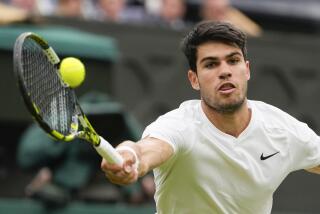Connors Gets Aced Out in First Round : Seguso’s Big Serve Prevails; Vilas and Shriver Are Also Upset
- Share via
WIMBLEDON, England — Is this the end of Jimbo?
Has jolly old England seen the last of Jimmy Connors, the kid who came in with the bangs and wanted to go out with a winner?
Will the green, green grass of Wimbledon ever again be stepped on by those cranky Yankees, J.S. Connors and J.P. McEnroe?
Connors wasn’t saying Tuesday after somebody named Robert Seguso had ushered him through the earliest exit of his Wimbledon life, 6-3, 3-6, 7-6, 7-6. It was the first time that this particular fighter had ever gone down in the first round.
But if he was going down, he was going down swinging.
“What are your plans?” he was asked.
“I don’t really have any,” said Connors, 33. “I don’t have to make a snap decision right now.”
“Will you be back at Wimbledon next year?” he was asked.
“Next year’s a long time away,” Connors said.
“Was this a great disappointment?” he was asked.
“I don’t look at it that way,” Connors said. “Do you?”
“We asked you.”
“Well, nobody’s perfect. Especially me,” Connors said. “Nobody likes to lose. But when you lose something, sometimes it makes you more eager to get it back.”
“Do you think this will make you more eager?”
“I’m not going to answer that, because I can’t tell,” Connors said.
“Do you think this might have felt worse 10 years ago, when you were in your prime?”
“I don’t like to lose anytime,” Connors said. “I mean, if you don’t know that by now, then you haven’t been around long enough. I don’t like to lose in the first round, and I don’t like to lose in the final.”
A British gentleman of the press pressed on.
“But you don’t know for sure if you’ll be back for another go?” he asked.
“What’s your problem?” Connors asked back. “Why do you want me to get out of tennis? That’s part of your problem over here.”
“But Jimmy . . . “
“Wait, just let me explain what I’m trying to say,” Connors said. “You don’t know what you have until you lose it. That’s what you’re feeling toward McEnroe right now. You’re so quick to jump on him and call him every name in the book, and then when he doesn’t come, you miss him.
“Are you going to do the same with me if I don’t come back next year?” Connors asked.
“Let me make my own decision whether I’m going to play or not. Don’t you worry about that. That’s not your worry. Whether I’m going to play more tennis or not, or Wimbledon or not, it’s not your worry. Whether you know right now or eight months from now or never know, that’s not your concern. It’s only my concern.”
So ended the 1986 Wimbledon of Jimmy Connors, a fortnight settled in a little more than four action-packed hours, including the press conference.
This was not the first first-round loss of his life, but it was the first in a Grand Slam event since the 1972 U.S. Open. It was inflicted by a man, Seguso, who usually specializes in doubles--he won the 1985 U.S. Open championship partnered with that other immortal of singles, Ken Flach.
It was also Seguso whom Connors had been playing June 14 at the Queen’s Club in England when a pulled groin muscle forced Connors to withdraw. Tuesday’s match was his first court appearance since then, but Connors said that the injury had troubled him not at all.
What did trouble him was Seguso’s huge serve, a serve so hard and consistent that in the final rousing tiebreaker, won 10-8, Seguso even aced Connors on a second serve.
“He was unconscious to the point of serving bomb after bomb after bomb,” Connors said. “The question is, was it a one-time thing or will he be able to do it again tomorrow or the next time after that?”
Seguso is a tall, 23-year-old right-hander, born in Minnesota, schooled in Illinois at Southern Illinois Edwardsville, and a resident of Florida. Although his claim to fame is in doubles, he did reach Wimbledon’s round of 16 in singles last year.
The third-seeded Connors, a six-time Wimbledon finalist, did not play poorly, but Seguso slammed home 10 aces and made acrobatic rallies a la Boris Becker, sometimes diving head first to save a point. “I gave it everything I had,” Seguso said.
Connors was not the only favorite eliminated. Pam Shriver, seeded No. 5 among the women, dropped her first-round match with American Betsy Nagelsen, 4-6, 6-3, 6-4. And the men’s 15th-seeded player, Guillermo Vilas, fell in straight sets to Australia’s Pat Cash, 6-4, 6-2, 6-3.
“Not bad for a guy ranked about No. 700,” Cash kidded later. He is low, but not that low.
The highest and mightiest, however, won their matches, top-seeded Ivan Lendl defeating Mexican teen-ager Leonardo Lavalle, 7-6, 6-3, 6-4, and top-seeded Martina Navratilova beating Australia’s Amanda Dingwall, 6-3, 6-2. Chris Evert Lloyd also won, 6-4, 6-1, over Florida schoolgirl Mary Joe Fernandez.
Nagelsen, 29, has no major victories to her credit, unless you count Australian Open doubles, but she did defeat Navratilova once, in 1981, and called this her biggest triumph since that. This was her first victory over Shriver, whom she had played “bunches of times.”
Until the Connors match, late in the day, Nagelsen’s victory had been the big upset, on a par with Kevin Curren’s defeat in the men’s bracket the day before. Now, more than ever, it appears that this will be a tournament of upsets, in what Curren and others have called the most wide-open Wimbledon in memory.
Many eyes are on Lendl, who, although favored, has never won this tournament. “I came out here to give it my best,” the Czech said after beating the 18-year-old Lavalle. “If I win, I shall be very happy, and if I don’t, I can only wait another year and give it my best again.”
Wimbledon Notes It took three tiebreakers before UCLA’s Brad Pearce was eliminated by Britain’s Nick Fulwood, 7-6, 6-7, 6-2, 7-6. . . . Marcel Freeman, the former UCLA All-American, is Ivan Lendl’s next test. . . . Drugs, schmugs. Wimbledon officials got down to serious tennis problems Tuesday by fining Miroslav Mecir of Czechoslovakia $250 for “warming up in a jacket with an oversized manufacturer’s logo.” . . . Correction on Kevin Curren’s being the first Wimbledon finalist eliminated in the first round the next year.
Manuel Santana won the men’s singles in 1966, then lost his opening match of 1967 to Charlie Pasarell. Curren, who lost to Eric Yelen on Monday was fined $1,000 Tuesday for unsportsmanlike behavior. . . . John Lloyd, the husband of Chris Evert Lloyd, announced his retirement from singles play after losing to Christo Steyn of South Africa. The scores were 3-6, 2-6, 6-3, 6-3, 6-1.
More to Read
Go beyond the scoreboard
Get the latest on L.A.'s teams in the daily Sports Report newsletter.
You may occasionally receive promotional content from the Los Angeles Times.










